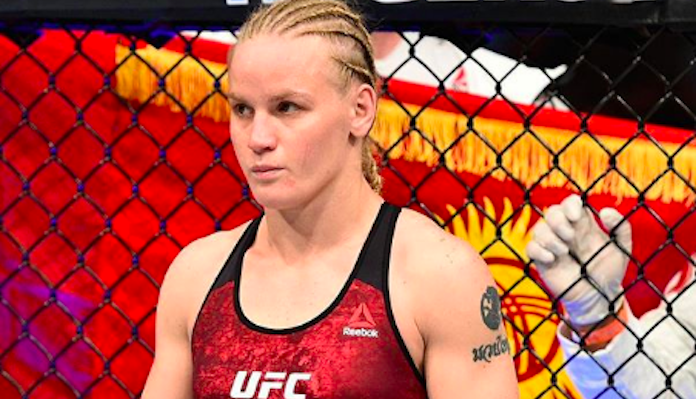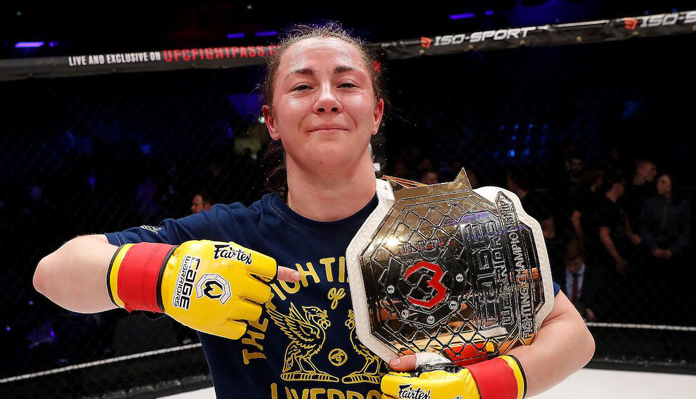Examining the future of MMA for women
As the UFC continues to grow in popularity, new doors open for both competitors and fans. One of the sectors that has seen the most growth is women’s mixed martial arts. Pioneers such as Ronda Rousey and Rose Namajunas have paved the way for future athletes and turned women’s MMA into a mainstream attraction.

So what does the future have in store for women’s MMA? BBC Sport recently unpacked teh topic with UFC stars Molly McCann and Valentina Shevchenko to get their thoughts on the topic.
From Football To Fighting
Originally from Liverpool, MMA fighter Molly McCann made her pro debut in the UFC in 2015 and has never looked back. A former player for Liverpool FC Women, McCann demonstrates athletic versatility which she applied to boxing before successfully transitioning to MMA. She even praises MMA for being all-inclusive, a stark contrast to the discrimination she faced in sports like football.
“I’ve never been turned away from an MMA gym, I have always been encouraged and I think that comes from the mix of different disciplines – people are a lot more open-minded to women, ethnicity, sex, sexual orientation.”
The Culture of BJJ
Many martial arts, particularly Brazilian jiu jitsu, celebrate inclusivity and respect which opens doors for women hoping to try the sport. McCann supports this notion.
“It all stems from Brazilian jiu-jitsu and the culture is ‘we are one’. The second you step on the mat you’re accepted with open arms.”
She attributes her positive attitude, which transcends the sport, as instrumental to her success.
“It’s the discipline and respect I learned that has got me to where I am, not just in martial arts but as a human being.”
“I try to give the best of me to someone else, it’s not just ‘I want to be a fighter’, it’s a lifestyle, bettering yourself.”
Overcoming adversity through MMA
She acknowledges the discipline of sport as having a transformative aspect of her life. In that regard, children and young girls can tackle mental and physical challenges in MMA to give them a sense of structure and fulfilment.
“For a little girl, or any young person, if you can step on a mat every day and overcome your adversities then when you come to life it’s easy,” said Molly.
Grace and Equilibrium, Tranquility and Knowledge
Likewise, Valentina Shevchenko describes how MMA has nurtured her personal and physical development.
Originally from a Muay Thai background, Shevchenko is the current UFC women’s flyweight champion and a third-degree black belt in Taekwondo. She discussed with BBC sport the impact fighting has had on her life.
“In my life, I had all kinds of support if I ever needed to become a good fighter…Sport gives to your body grace and equilibrium and to your mind, tranquillity and knowledge.”
Using sport to boost self-esteem
Since the proliferation of social media and advertising, women’s insecurities are greater than ever. If women can find self-assurance in sports like MMA, this can be beneficial for their mental wellbeing. Valentina Shevchenko hopes we see a rise of women in the sport whose confidence is affirmed by practice and dedication.
“I really hope so…Because I love to see more beautiful and confident girls in this modern world,” she said. “MMA gives it all. Even if you are not going to be a professional fighter you have to try and practise martial arts.
The Power of Promotion
Valentina Shevchenko acknowledges high profile fights such as Jessica Andrade vs. Rose Namajunas at UFC 237 and her bout against Joanna Jedrzejczyk at UFC 231 generate lots of attention. She hopes this will encourage more women to engage in the sport and love it just as much as she does:
“I’m doing what I love to do,” she said. “Martial arts is my everything. It’s my life, my philosophy, how I think, who I am.” (via ESPN)
So how will the evolution of MMA and the UFC effect women? Here are a few points to consider?
Changing Demographics
The increased variety of MMA fighters should pay dividends regarding viewerships numbers and increased diversity of demographics. Greater multicultural and gender diversity increases accessibility for female fans. Madonna and Demi Lovato are just two of many celebrity UFC fans who represent the female audience and the increase popularity of the sport.

Entertainment Opportunities
It has been a long-standing tradition for fighters to transition into the entertainment industry after making their UFC debut. Ronda Rousey, for example, has moved onto the big screen, featuring in The Expendables, Fast & Furious and Entourage. Also, with the rise of podcasts and media platforms like Netflix, the career prospects for female fighters are endless.
Fan Interactivity
The voices of fans are heard louder now than ever before. Thanks to social media platforms like Instagram and Facebook, female UFC fighters are able to communicate with fans and strategically fight bouts in accordance with the desires of the audience. As Shevchenko and McCann have mentioned, greater accessibility to MMA and support networks can inspire future generations.
Closing the Pay Gap.
The pay gap between men and women has recently been a topic of contention. Nevertheless, the rise in demand for women’s MMA presents financially lucrative opportunities for future fighters. As an example, UFC stars like Amanda Nunes and Cris Cyborg have had great success, out-earning many of her male peers. Fan meet and greets, merchandise sales and guest appearances boost financial incentives for future fighters.
***
MMA is constantly evolving. It is impossible for us to predict the status of the sport in 50 years time. What we can say for certain is the rise of fighters like McCann and Shevchenko has concretized the women’s division in the UFC and created endless possibilities for the future generations, if they choose to take them.
This article appeared first on BJPENN.COM
Topics:
UFC








